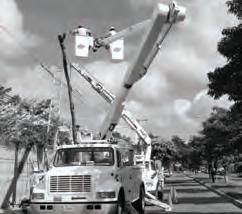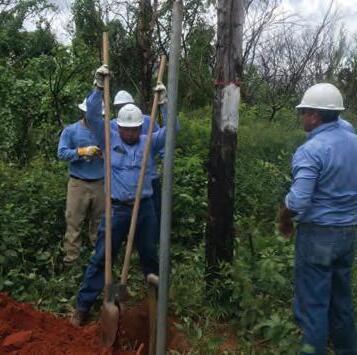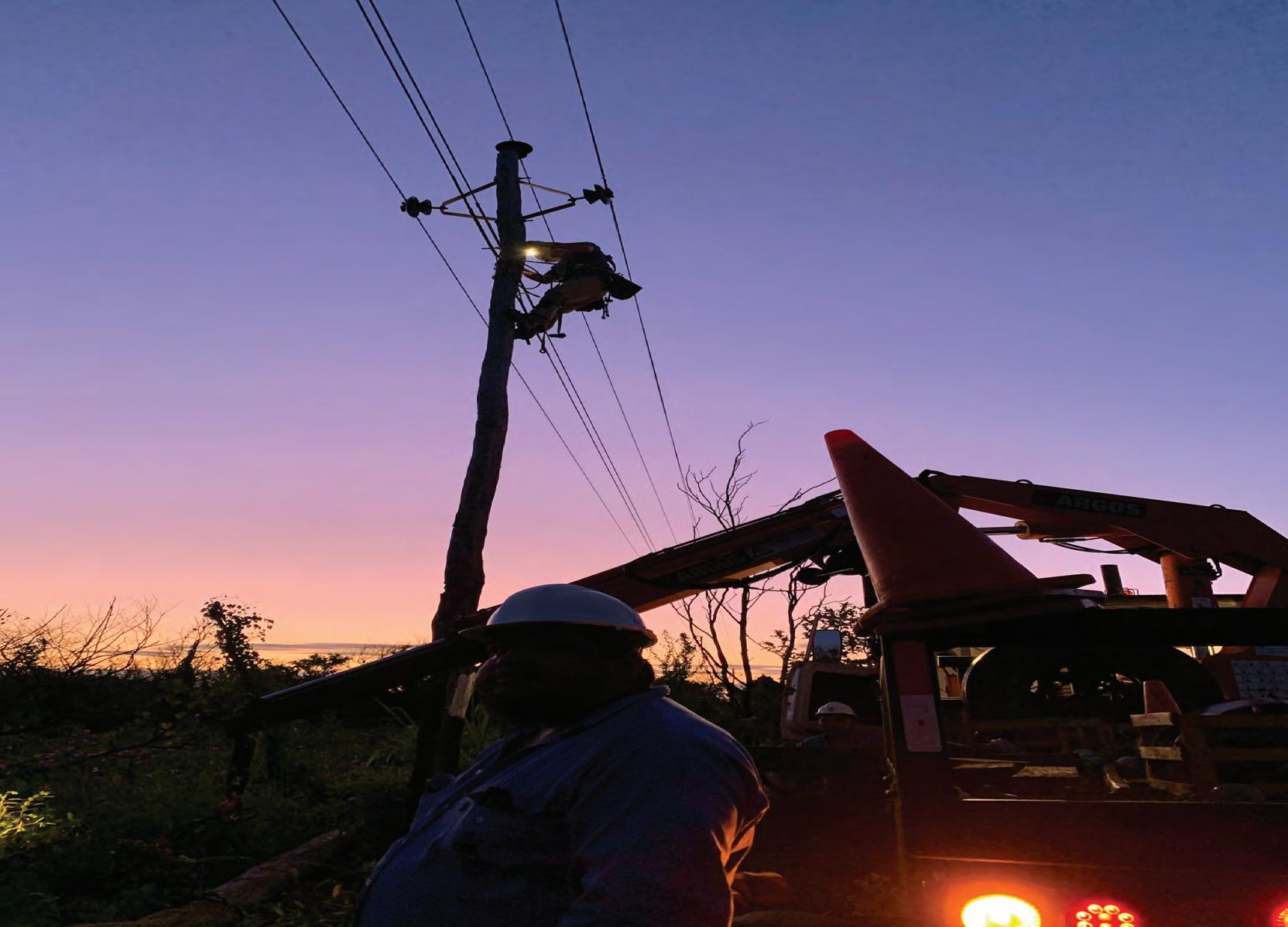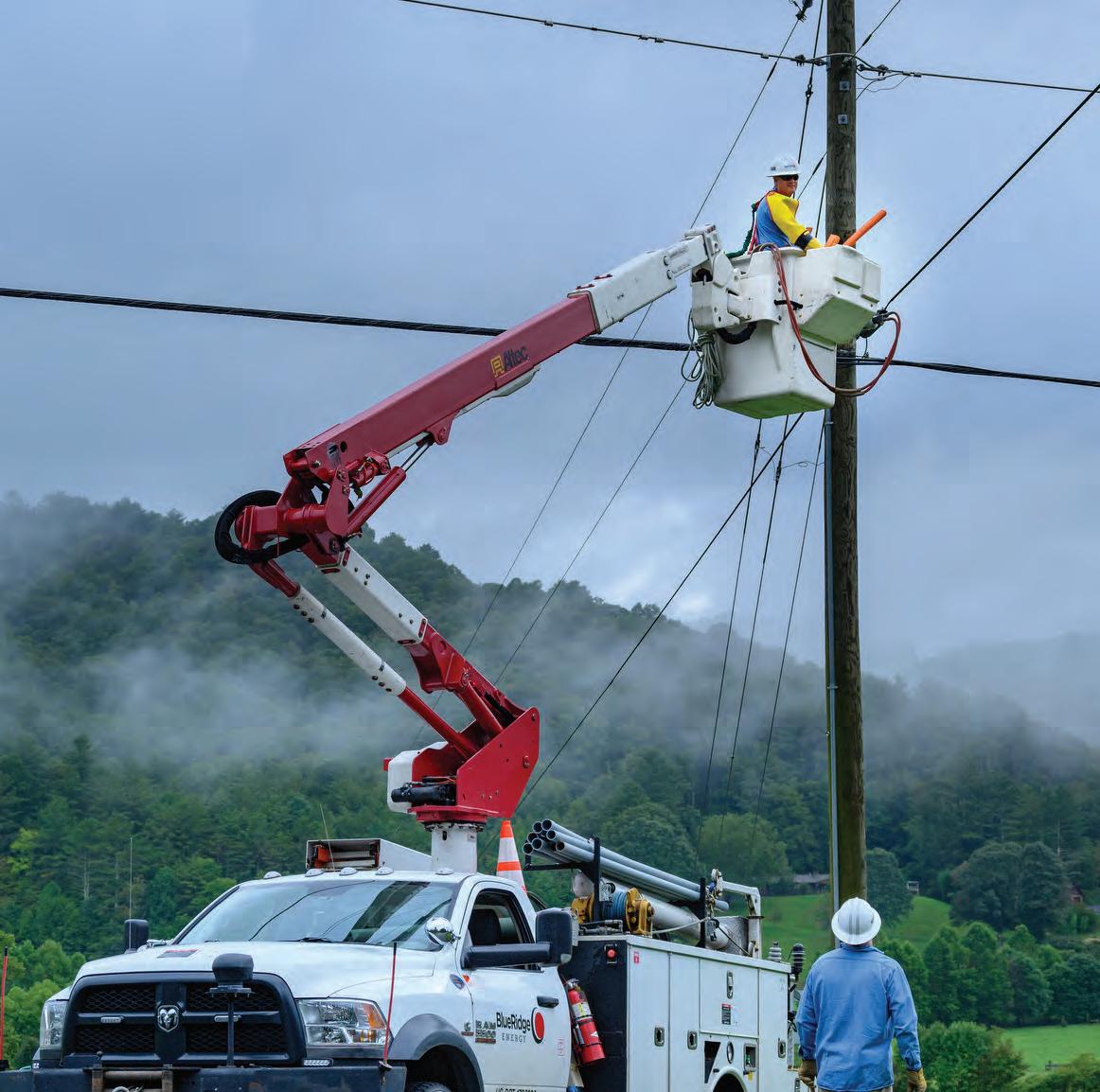Membership
MATTERS
Caring For Natural Habitats While Maintaining Rights-Of-Way
Enhancing the natural beauty of western North Carolina while ensuring reliable electricity for members and a safe working environment for our line technicians is why Blue Ridge Energy takes great care to control trees and large brush in rights-of-way.
Our vegetation management program combines several growth control methods that balance scenic beauty with safe, reliable power. We also work with members who want to join us in this effort.
A recent program is making funds available to members who want to convert rights-of-way on their property to wildlife habitats.
Up to $500 per acre is available to members who have cooperative rights-of-way on their property in wooded or other qualifying areas. The funds help offset costs the member would incur to remove trees and plant certain types of grass, low-growing shrubs, wildflowers and other low-growing vegetation to attract wildlife such as rabbits, turkeys, birds, deer, honeybees and other pollinators.
Members qualify for funds only if they contact Blue Ridge Energy’s vegetation management staff and receive approval prior to the start of their project.
Programs like this not only benefit the environment and improve appearance, but they also help ensure reliable electricity for members and give line technicians a safe pathway while working on power lines.
Scan below to learn more!
Honoring Our Past, Powering The Future
Electric cooperatives were created in the 1930s to bring power to rural America—places traditional utilities wouldn’t serve. As we celebrate the International Year of Cooperatives, we’re proud to recognize how that same spirit of service is transforming lives across the globe.
Blue Ridge Energy has been part of this international effort for decades.
In the early 1960s, we helped launch CRE (Cooperativa Rural de Electrificación) in Santa Cruz, Bolivia. At the time, the region lacked even the most basic infrastructure. Streets were unpaved. Water, sewer, phone, and electric services were minimal or nonexistent. While the economy showed promise, poverty was widespread, and opportunity was limited.
A pivotal moment came in 1961 when Santa Cruz community leader Augusto Bernal met Clyde Ellis, general manager of the National Rural Electric Cooperative Association (NRECA), at a conference in Colombia. That meeting sparked the first cooperative
agreement between NRECA and the U.S. Agency for International Development under the Kennedy administration, focused on improving living conditions across Latin America.
Soon after, Blue Ridge Electric signed a sister-cooperative agreement with CRE. Under the leadership of our then-manager Cecil Viverette, we provided engineering and operational support (as well as many other services over the years) that helped CRE not only get off the ground— but thrive: today it’s the world’s largest electric cooperative!
The partnership continues today through staff exchanges and shared expertise. And now, CRE is paying it forward—mentoring other emerging co-ops around the world. It’s a powerful reminder of what cooperation can accomplish.
For the International Year of Cooperatives, we’re proud to celebrate a business model built on service, community, and global connection—one that continues to light the way here at home and far beyond.
From Blue Ridge CEO
Katie Woodle
Winter Home Hibernation: Protecting Your Home & Saving You Money!
When you leave your mountain home for the colder months, a little preparation goes a long way in protecting your property and controlling costs:
1. Freeze Protection Power Play: Set Your Stat Wisely
› Your action: Don’t turn your heat completely off. Instead, set your thermostat to a “freeze protection” temperature, usually 50-55°F. This prevents pipes from freezing and bursting, which can cause massive damage, while still minimizing heating costs.
› Why it helps: Prevents costly repairs and helps manage the heating needed to prevent disasters.
2. Water Heater Winter Nap: No Hot Water for Empty Houses
› Your action: If your water heater has a vacation mode, set it. If not, consider turning off your electric water heater at the breaker.
› Why it helps: Eliminates one of the largest continuous energy draws in a vacant home.
3. Deep Appliance Disconnect: Total Power Pause
› Your action: Consider unplugging larger, non-essential appliances like microwaves, toasters, and even washing machines. For very long absences, you might consider turning off non-essential breakers (consult an electrician if unsure). Use a few inexpensive light timers to turn lights on and off sporadically, giving the appearance that the home is occupied.
› Why it helps: Reduces electricity used by some devices even when they’re turned off.
4. Pipe Protection Plan: Guard Against the Cold
› Your action: Insulate exposed pipes in unheated areas (crawl spaces, attics). For areas particularly prone to freezing, consider installing heat tape before turning off the water main. If you drain your water system for winter, ensure it’s done correctly.
› Why it helps: Prevents pipe damage, avoiding emergency energy use.
5. Ventilation Vigilance: Keep the Air Flowing
› Your action: Ensure crawl space vents are properly closed for winter to reduce cold air infiltration. For homes with full basements, ensure windows are closed and sealed.
› Why it helps: Minimizes heat loss from the protected living space.
6. Outdoor Faucet Farewell: Drain & Disconnect
› Your action: Disconnect garden hoses and drain outdoor faucets. If you have an outdoor water main shut-off, it’s wise to use it.
› Why it helps: Prevents pipe damage that could lead to water damage and related energy use upon return.
7. Refrigerator & Freezer Strategy: Efficient Storage
› Your action: If leaving for an extended period, try to empty and defrost your refrigerator/ freezer and leave the doors slightly ajar to prevent mold. Or, if keeping it running, ensure it’s full (more efficient when full) and seals are good.
› Why it helps: Avoids energy use for an empty appliance or optimizes the energy of one you keep running.
To help our former members receive refunds due to them through the cooperative’s capital credits retirements, all unclaimed capital credits are listed on our website. To check the list, visit BlueRidgeEnergy.com and click the “Residential” tab. Click the “Money Back to You! Capital Credits” and scroll to the bottom of the page to find the “Unclaimed Capital Credits” link.
Do You Have Money Waiting?
Unclaimed capital credits are funds waiting for our former members for whom we don’t have a valid address. This is an important reason to always contact us any time your address changes.
If you are on the list, please contact us Monday through Friday, 8:30 a.m. to 5 p.m.
Proof of identity will be necessary to receive the refunds.
For The Best Service...
Please contact us any time you change your telephone number, e-mail or mailing address. This helps us provide you with the best member service experience, especially during outages or when you need us. It also ensures the timely delivery of important items such as your capital credits refund!
Katie Woodle
EDITOR
Renée R. Walker PRODUCTION
Puckett
(PowerLine* is
OFFICE HOURS: 8:30 AM - 5:00 PM Monday - Friday Kiosks available













